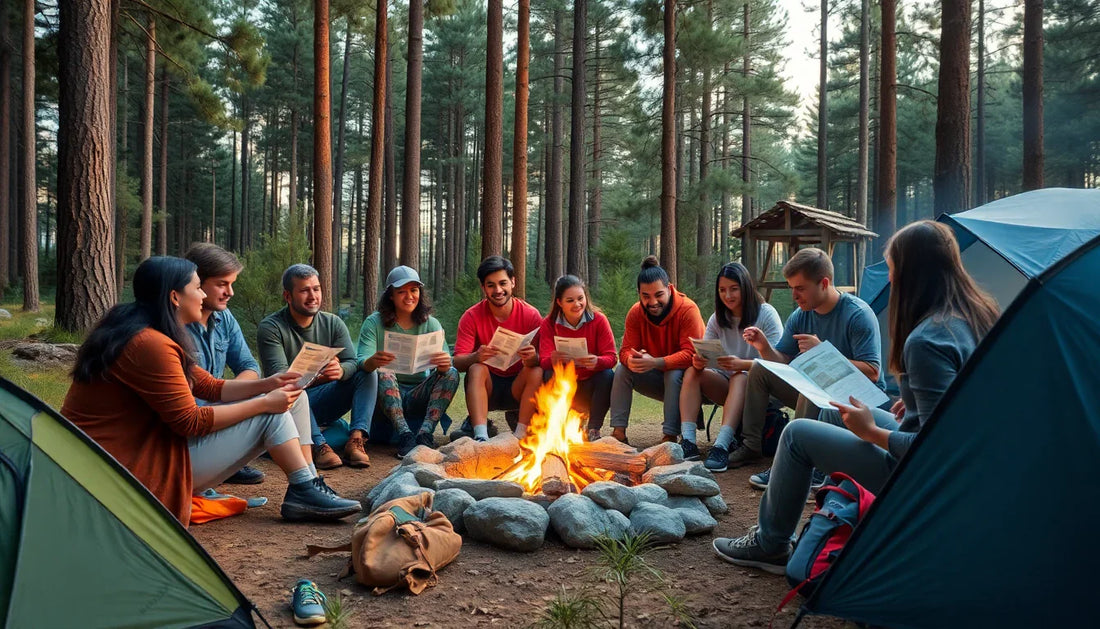
Camping Myths Debunked: What's True and What's Not?
Share
As the leaves begin to change and the crisp autumn air settles in, the call of the great outdoors beckons once again. For many, the prospect of packing up and heading into nature for a camping adventure is an exhilarating one. However, the world of camping is often shrouded in myths and misconceptions that can lead to frustrating, or even dangerous, experiences.
At GlowCamp, we believe that understanding the truth behind these common camping legends is essential for outdoor enthusiasts to have safe, comfortable, and truly memorable adventures. That's why we're here to debunk the myths and separate fact from fiction, empowering you to make the most of your time in the wilderness.
Fire Starting Myths
One of the most fundamental skills for any camper is the ability to start and maintain a fire. Yet, there are several persistent myths that can lead to unnecessary struggles and potential hazards.
Myth 1: Any wood will work for a campfire. In reality, not all wood is created equal when it comes to fire-starting. Certain types of wood, such as green or wet wood, can be incredibly difficult to ignite and sustain a flame. The key is to seek out dry, seasoned hardwoods that are low in sap and high in density, like oak, maple, or birch. These woods will burn hotter and longer, making them ideal for campfires.
Myth 2: Matches are always a reliable fire-starting tool. While matches are a common go-to for many campers, they can be susceptible to the elements, especially in damp or windy conditions. Instead, consider investing in a high-quality lighter or ferro rod, which are less affected by moisture and can provide a more consistent spark. Additionally, always carry a backup fire-starting method, such as waterproof matches or a magnesium fire starter, to ensure you're never left in the dark.
Tent Setup Misconceptions
Properly setting up your tent is crucial for a comfortable and protected camping experience, but there are several common myths that can lead to subpar shelter.
Myth 1: Any flat surface is a suitable campsite. While finding a level spot may seem like the primary concern, there are other important factors to consider when selecting a campsite. Avoid low-lying areas that may be prone to flooding, and seek out sites with good drainage to prevent your tent from becoming a soggy mess. Additionally, be mindful of overhead hazards, such as dead tree branches, that could pose a safety risk.
Myth 2: Waterproofing is only necessary for the tent's exterior. Many campers mistakenly believe that as long as the outer shell of their tent is waterproof, they're protected from the elements. However, the floor of the tent is just as important, if not more so, when it comes to keeping moisture at bay. Look for tents with a durable, waterproof floor that will create a reliable barrier between you and the ground.
Survival and Safety Myths
Camping can be an incredibly rewarding experience, but it's essential to separate fact from fiction when it comes to wilderness survival and safety.
Myth 1: Moss grows on the north side of trees, so it can be used as a compass. This popular legend is simply not true. Moss growth is influenced by a variety of factors, including moisture, sunlight, and tree species, rather than a consistent orientation. Instead, rely on a compass or other navigation tools to ensure you don't get lost in the wilderness.
Myth 2: Drinking your own urine can keep you hydrated in an emergency. While this myth has been perpetuated in survival stories and movies, the reality is that urine is not a reliable source of hydration and can actually be harmful if consumed in large quantities. In a true survival situation, focus on finding clean, potable water sources or using water purification methods to stay hydrated.
Camping Food and Gear Myths
When it comes to fueling your outdoor adventures and ensuring you have the right equipment, there are several common misconceptions that can lead to suboptimal experiences.
Myth 1: Dehydrated meals are the only practical option for camping food. While dehydrated meals are certainly convenient, they're not the only nutritious and delicious choice for campers. With a little planning and preparation, you can enjoy a variety of fresh, wholesome meals that will keep you energized and satisfied. From hearty stews to grilled vegetables, the possibilities are endless.
Myth 2: Expensive, specialized gear is always better. It's easy to get caught up in the allure of the latest and greatest camping equipment, but the truth is that quality and functionality are more important than price tag. Focus on investing in durable, versatile gear that meets your specific needs, rather than falling for the hype of the newest, shiniest products.
Bug and Wildlife Myths
Navigating the great outdoors means coexisting with the diverse array of insects and animals that call it home. Unfortunately, there are several persistent myths that can lead to unnecessary fear or dangerous encounters.
Myth 1: Bug spray is the only effective way to prevent insect bites. While bug spray can be a valuable tool, it's not the be-all and end-all of insect protection. Wearing long sleeves and pants, using citronella candles, and avoiding scented products can also help deter mosquitoes and other biting bugs. Additionally, certain natural repellents, such as lemongrass or peppermint oil, can be just as effective as chemical-based sprays.
Myth 2: Feeding wildlife is a harmless way to interact with nature. In reality, feeding wild animals can have serious consequences, both for the animals and for the humans involved. Not only can it disrupt the natural foraging behaviors of the animals, but it can also lead to aggressive behavior and increased risk of disease transmission. The best approach is to admire wildlife from a respectful distance and let them thrive in their natural habitats.
Conclusion
As you embark on your next camping adventure, remember that separating fact from fiction is key to a safe, comfortable, and truly memorable experience. By debunking these common myths and embracing the truth about fire starting, tent setup, survival skills, camping gear, and wildlife interactions, you'll be well on your way to becoming a more informed and confident outdoor enthusiast.
At GlowCamp, we're dedicated to providing curated, functional camping gear designed to make the great outdoors feel like a home away from home. Browse our selection of high-quality, myth-busting products and let us help you create unforgettable memories in nature.
